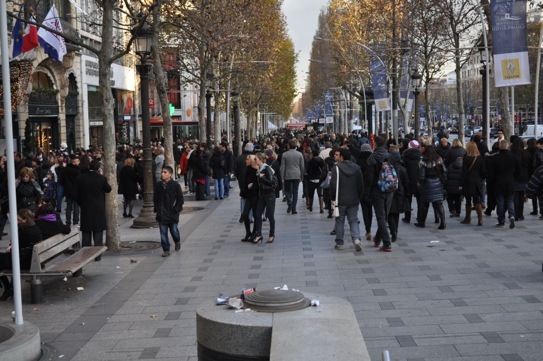I did get two interviews. In two hours. Plus one bit of pungent walk-by commentary. I’ll chronicle the whole effort later, but here’s the feedback from today.
Thomas — in his 30s, and looking like a classic clean-cut-with-stubble French professional — described himself as ‘not a typical Parisian’, though he never quite explained what that meant. His general view of the Euro crisis that of running towards a cliff: everything’s fine until you hit the edge, and then ‘boom’. He focused mostly on the cultural differences between the Germans and everyone else — in particular, getting the Germans to share anyone else’s point of view or to acknowledge that there might be a better or at least different way. As he put it, the Germans are great marketers, but after a while they begin to believe their own marketing, and so does everyone else.
He also drew another interesting comparison between the Germans and the French. He said (again paraphrasing) that Germans resist any change, but when they are finally convinced that change is necessary, they go through a period of upheaval (Thomas said “chaos”) and then make real, substantive change. By contrast, he said, the French are always willing to tweak and adjust, but they never seem to make the fundamental, ground-up changes that are needed.
Finally, Thomas seemed to be genuinely torn between admitting that the Germans pretty much are correct in needed to be fiscally responsible and at the same time wondering if the cure is going to simply make things worse. Thomas used the analogy of a starter (by which I believe he meant the choke) on an older car — that if the engine is really cold, you need to pull the starter out to get the engine started. But he also acknowledged that the rest of Europe had been continuing to drive with the starter pulled out, and that this wasn’t very good for the engine.
As far as the ultimate fate of the Euro and possiby the European Union itself, Thomas acknowledged that the risks and dangers are there, but said, “At the end of the day, we have no choice — they will have to work this out.”
A while after I spoke with Thomas, a tall, dishevled man stood a ways off and read my sign. He then walked towards me, laughing, though not in a friendly way. As he passed close to me, he gave me the bird and said, walking away behind me, “America is the problem, not Europe. F**king America, f**king dollar…” More than that, I could not make out, due to the noise of the area.
My other real interview of the afternoon was Matthieu, who looked to be in his 20s and of Asian descent. Matthieu, who said he worked at a bank, felt that the origin of the current EU crisis was the American banking (by which I think he meant financial) system itself. In effect, he said that American financial firms were (for a while) so successful at getting higher and higher returns on investment that European banks felt they could and should do the same, instead of remaining conservative and content with lower returns on lower risks. In particularly, he was critical of ‘state’ banks that try to compete with private banks but can’t, really.
Interestingly, as for sovereign debt, Matthieu actually saw the American debt problem as the bigger crisis. He felt that a major financial downturn by the EU would weaken it but not have a lot of impact outside of Europe, while a similar financial collapse by the US would seriously impact the rest of the world. He also had serious concerns about China, where (as he put it) the rulers are rich but everyone else is poor, and that the governmnet is having a hard time managing that.
Next post: why it took me two hours to get two interviews today. ..bruce w..
